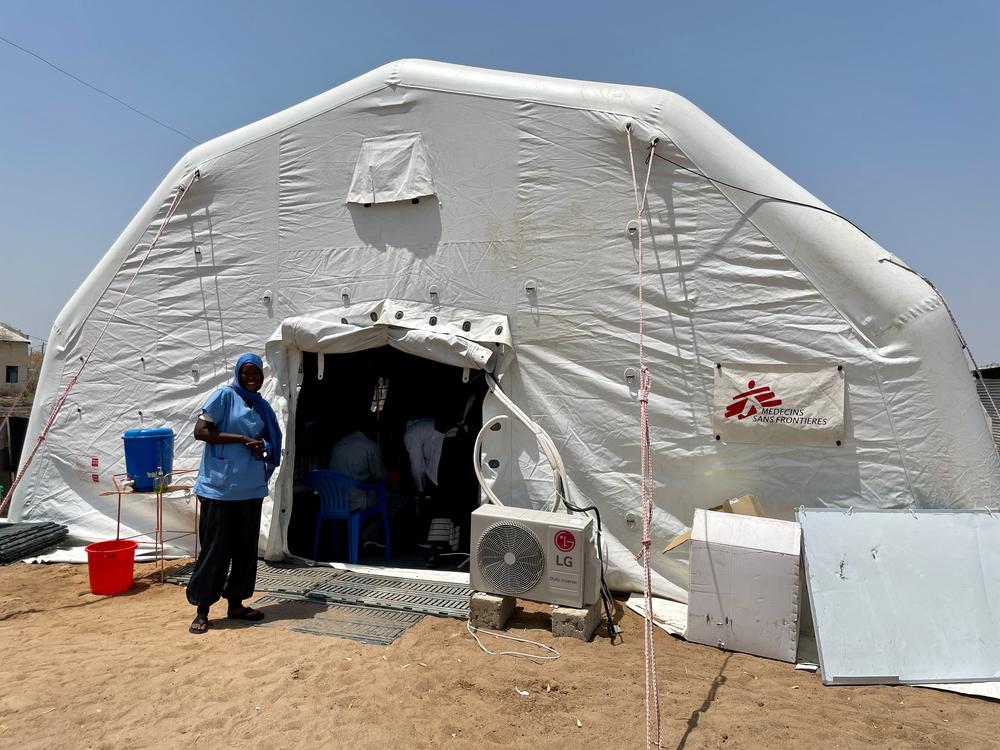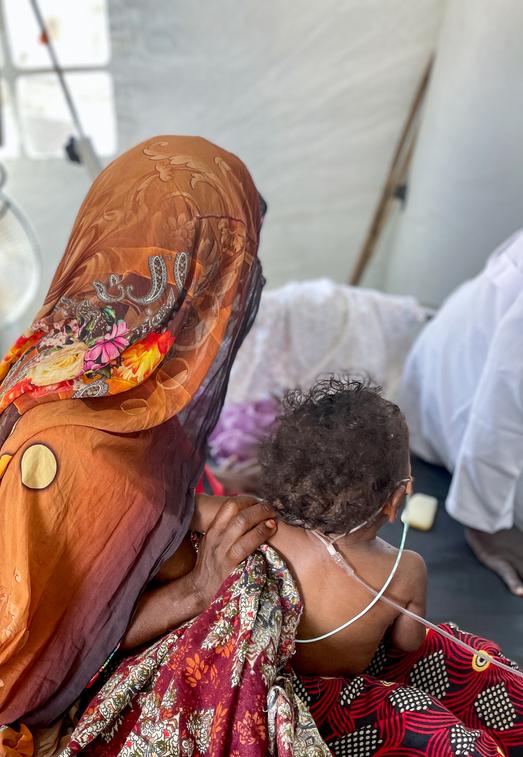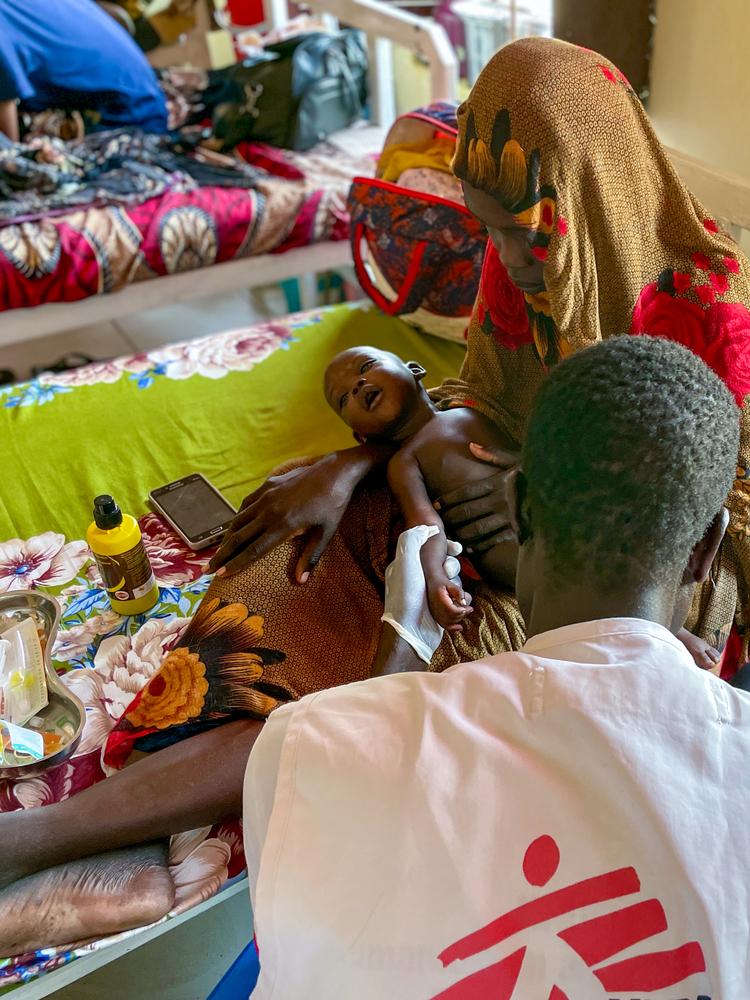Since the start of the war in Sudan in April 2023, the town of Renk in South Sudan has received an influx of refugees and returnees fleeing the conflict. This dramatically increased the demands on the existing healthcare system, which was already stretched due to economic instability and previous conflict. Paediatrician Cathy Branthwaite joined the emergency project Doctors Without Borders (MSF) set up to support the paediatric department at the town’s hospital. She describes the day a four-day-old baby with meningitis in Sudan arrived at the hospital during a heatwave.
In March 2024, Renk experienced an extreme heatwave, with temperatures soaring above 45 degrees. Schools went into lockdown, and more people died from heat-related illnesses.
Among children, there was a surge in severe dehydration, increased infections due to lack of access to safe drinking water, and premature and low birth weight babies struggling to survive.

The MSF team at the hospital had erected a tent to accommodate many critical patients, but the temperatures within the tent became unbearable, reaching over 50 degrees. The logistics staff had to work against the clock to erect a larger, cooler tent to transfer the unwell children. Vital machines, including electricity generators and oxygen delivery systems, broke down due to overheating, resulting in multiple daily resuscitations.
The First 48 Hours
During a heatwave, a woman arrived at the hospital with her four-day-old baby boy, who was critically unwell with fever, vomiting, and seizures. The clinical team quickly sprang into action to resuscitate the baby, who was barely breathing with a dangerously low heart rate, high fever, unconsciousness, and seizures. require
After a prolonged resuscitation, they were able to stabilize the baby, but his condition remained critical as he continued to have a high fever, oxygen, and experience seizures. The medical team closely monitored him and provided intravenous fluids to keep him hydrated while battling to control the fevers and seizures during the first 48 hours of admission.
The first 48 hours of admission were crucial; battling to control the fevers and seizures, we monitored him carefully and kept him hydrated with intravenous fluids.

After a prolonged resuscitation, with the baby’s life hanging in the balance, we were finally able to stabilise him. However, his condition remained critical…Cathy Branthwaite, an MSF Paediatrician in Sudan
Doing the best with what we have
In the UK, this baby would have been admitted to a paediatric or neonatal intensive care unit, where he would have been intubated and ventilated, with infusions of anti-epileptic medication to control the seizures and medications to control the blood pressure and heart rate.
In Renk, we do not have access to any of this and nowhere to refer the patient, so we had to do our best with our resources.
Various factors meant we felt that the most likely diagnosis was bacterial meningitis. South Sudan is in the ‘meningitis belt’: areas of sub-Saharan Africa at high risk of bacterial meningitis epidemics. Overcrowding is a known factor that can increase the spread of a meningitis outbreak, such as in a refugee camp like that in Renk. High population density increases the risk of rapid spread, with children most commonly and severely affected.
The health promotion team assisted in contact tracing, enabling the clinical team to identify children who have had contact with the often unvaccinated patients.
One tough baby
After 48 hours, the baby gradually started to improve, and by the fifth day, he was stable enough for us to perform a lumbar puncture to obtain samples of CSF (cerebrospinal fluid). These could then be flown to neighbouring countries for microbiological analysis (Renk has minimal laboratory capabilities, and no microbiological analysis is available).
Day by day, he improved and grew stronger. He required a three-week course of intravenous antibiotics. By the end of the admission, he had recovered from the meningitis and was also breastfeeding well, gaining weight, and smiling! He was one tough baby.
As he had been so unwell on arrival and so young at only four days old, he was at higher risk for long-term complications such as developmental delay and ongoing seizures, however upon discharge there was no evidence of neurological damage.

Good news and reviews
On the day of the baby’s discharge from the hospital, we held a meeting to review the meningitis cases we had just seen in this recent outbreak and identify learning opportunities to improve our future practice.
The triage nurse who had carried the baby to the tent on arrival attended the meeting. We told him that the baby had survived and was being discharged that day – he hadn’t realised! He really was our little miracle baby.
Thanking for donors
MSF supports the local medical teams to provide a high level of care and medical supplies that is crucial for assisting a population that is in dire need of humanitarian assistance. This case provided hope and affirmation that our work with MSF in this area of South Sudan is crucial for giving babies and children a chance at life and survival against the odds. This work is only possible thanks to supporters like you. Thank you.
Meningitis is the swelling of the protective lining around the brain and spinal cord and is usually caused by a bacterial, fungal or viral infection. It can be a life-threatening infection, so if you suspect meningitis, get to a medical professional quickly. Vaccinations protect against some of the most common bacterial causes of the disease and help prevent its spread within communities.
Meningitis often presents with symptoms such as a sudden high fever, neck stiffness, severe headaches, confusion or altered mental status, nausea and vomiting, seizures, lack of appetite or thirst, and difficulty waking from sleep. If you experience any of these symptoms, it’s crucial to seek medical treatment immediately.
Meningitis vaccinations are the safest way to protect against the disease; some even reduce the chance of infections spreading in communities. Know the symptoms and when to get urgent professional medical help. Check that the people in your family and community are up to date with their meningitis vaccinations.
